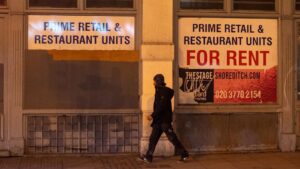
The number of restaurants falling into insolvency has increased by more than 60% in the past year amid worker shortages and the cost of living crisis, which has forced customers to cut back on spending.
New data from the accountancy firm UHY Hacker Young showed that 1,406 restaurants in the UK closed their doors in the 12 months to May, up 64% on the previous year.
In proportional terms, that is an even larger increase in closures than for the wider hospitality industry, which saw a 56% rise in insolvencies over the same period.
It comes on top of a number of high-profile restaurant businesses – including Byron, Gourmet Burger Kitchen and the Italian chains Strada and Carluccio’s – being forced to shut dozens of sites at the height of the pandemic as they incurred heavy financial losses during repeated lockdowns and other Covid restrictions.
“Pressure is rising on the restaurant sector every day. More and more of them are shutting their doors as a result,” said Peter Kubik, a partner at UHY Hacker Young.
“Restaurants that only just managed to survive the pandemic thanks to government support are now facing fresh challenges in the form of rising inflation, a post-Brexit labour shortage and consumers who simply cannot afford to spend as much.”
Research published in June by UHY found that losses at the top 100 restaurant groups had risen to more than £800m in the previous six months after being forced to undergo major restructuring programmes during the pandemic, when they were forced to subsist on state support packages that included business rates holidays and furlough payments for staff.
Businesses across the UK have since been dealing with a slowdown in consumer spending, as the prices of everything from gas and electricity to food and clothes soar.
Inflation, driven in part by the war in Ukraine, hit a 40-year high of 9.4% in June, a trend that has eaten into household income at a rate not seen since modern records began in 2001.
A further threat comes from the predicted increase in the annual energy price cap from just under £2,000 to more than £3,000 in October.
Analysts are warning that inflation could rise as high as 12% by October, putting households under further financial strain and forcing people to cut out extra costs, including eating out.
Meanwhile, pubs and restaurants have had to cope with fewer skilled people from the EU being available to work, because of post-Brexit migration restrictions that have caused issues with hiring staff, particularly kitchen workers.
Some independent restaurants were forced to offer hefty sign-on bonuses of £1,000 or more for chefs and other kitchen staff during the busy Christmas season.
Waves of new Covid variants have also contributed to shortages of staff available to work across the hospitality industry.
“Smaller restaurants are suffering the most from a shortage of EU staff post-Brexit,” Kubik said. “Many are finding that they simply cannot hire enough staff to serve the number of covers they need to stay profitable. That’s one of the reasons for the raft of closures we’re seeing.”
Read more:
UK restaurant insolvencies jump by more than 60% in year






